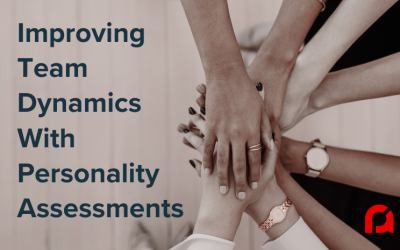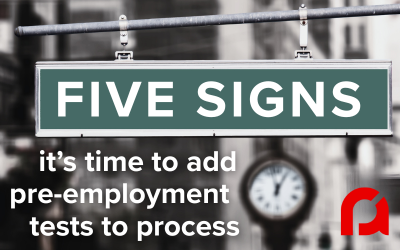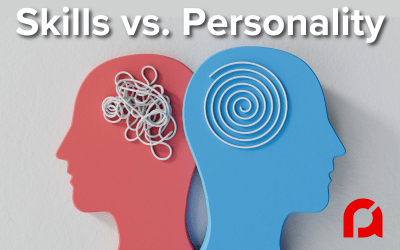How Hiring Managers Can Use Personality Assessments to Improve Team Dynamics
A great team isn’t just a collection of skilled individuals — it’s a carefully balanced mix of personalities, communication styles, and motivations that work well together. For hiring managers, understanding how a new employee will fit into that balance can be the...
Five Signs That It’s Time to Start Using Pre-Employment Assessments
Hiring decisions are generally a gamble, but some companies make them riskier than they need to be. Whatever stage your business is in, at some point, relying on gut instinct or a polished interview alone stops working. That’s where pre-employment assessments can add...
How to Choose the Right Pre-Employment Test for Your Organization’s Needs
Pre-employment testing has become a common part of the hiring process, especially for employers looking to reduce turnover, improve candidate fit, and make more objective decisions. But choosing the right test for your organization requires more than picking the most...
Creating a Data-Driven Hiring Process by Starting with Assessments
For many companies, hiring still begins with gut instincts, resume reviews, and a brief phone screen. While these methods can offer insights, they often fail to consistently predict performance. In today’s hiring landscape — where turnover remains high and talent is...
How to Interpret Personality Assessment Results: Practical Tips for New HR Pros
Hiring the right person starts long before the first day on the job. For companies that use personality assessments as part of the hiring process, the results can provide a wealth of insight — if interpreted correctly. For newer HR professionals who don’t have a...
Skills vs. Personality: Which Matters More for a Job Candidate?
Companies of all sizes often debate whether technical skills or personality traits matter more when screening job candidates. While technical skills can be taught, personality is inherent and predicts how a candidate will perform on the job. Further, research shows...
Pre-Employment Assessments: Next-Level Hiring Data for Small Businesses
Small businesses face unique challenges when it comes to hiring. With limited resources and lean teams, the hiring process must be efficient, and every hire must count. Pre-employment assessments can help a small business make the most of the hiring process, and...
Spotlight on Resource Associates’ Aptitude Tests: What They Measure and Why It Matters
In modern hiring, aptitude tests have emerged as one of the most valuable tools for evaluating a candidate’s potential. Aptitude tests go beyond technical expertise to assess cognitive abilities like logical reasoning, numeric reasoning aptitude, and problem-solving...
How to Interpret Personality Assessment Results: Tips for HR Professionals
Personality assessments offer valuable insights into a candidate’s work style and potential job fit. Yet, the true value lies in how HR professionals interpret these results. In today’s competitive market, knowing how to read an assessment report can make the...
Is a Personality Trait Trainable?
Nature versus nurture is a debate as old as psychology itself. When it comes to personality traits, however, the scales tip heavily toward nature. Traits like conscientiousness, extraversion, and agreeableness are inherent qualities that define how we behave in the...
The Importance of Prioritizing Cognitive Ability in Modern Hiring
In today’s fast-paced and ever-evolving job market, companies often face a choice: Should they prioritize technical skills or cognitive ability when hiring new talent? While technical skills are essential for certain roles, cognitive ability — the general capacity...
Identify a Candidate’s Teamwork Potential with Personality Testing
Teamwork is often described as the glue that holds successful organizations together. But not everyone works best in a collaborative environment. Some employees thrive on independence, while others excel at working cohesively with others. So, can a personality test...
Why Aren’t My Pre-Employment Assessments Finding Good Hires?
Pre-employment assessments help companies make better hiring decisions by providing insights into a candidate’s personality, aptitude, and skills. But what happens when the testing process leads to numerous hires that result in turnover? It’s a frustrating...
Do Skills Assessments Alone Help Companies Make Good Hires?
Skills assessments are often seen as a straightforward way to verify a candidate’s abilities. They measure proficiency in specific areas, from software skills to technical know-how, offering an objective snapshot of what a candidate can do right now. However, as...
How to Improve the Way You Implement Pre-Employment Tests in 2025
Pre-employment tests have long been a powerful tool for helping companies make smarter hiring decisions. But, as with any tool, how effectively these assessments work depends on how they’re used. In 2025, it’s time to take a fresh look at how pre-employment tests fit...
Evaluating Candidates with the Right Type of Pre-Employment Test
Pre-employment tests have a history that spans at least the last century. With the increased availability of these tools on the internet, businesses have only increased their use, allowing them to better predict the best fit between a job candidate and an open...
Pre-Employment Tests Can Position Businesses for Steady Growth
Steady business growth isn’t just about increasing revenue — it’s about building a stable foundation that supports long-term success. One of the most effective ways to ensure that stability is by making the right hires from the start. Good hires are more than...
High Attrition Levels Are When Good Hires Matter Most
High employee turnover can disrupt any business, affecting everything from productivity to morale. When attrition levels rise, it can be helpful to examine why employees are leaving. Even though some variables cannot be changed, such as nearby competitors attracting...
Finding & Developing Future Leaders
Identifying and cultivating future leaders is one of the most important tasks for any organization focused on long-term success. The ability to spot leadership potential early on and invest in its development not only helps shape the company’s future but can also...
Can a Job Candidate Develop Their Weaknesses?
When evaluating job candidates, pre-employment personality tests can reveal much about a person’s strengths and possible areas of concern. The question then arises: should employers take a chance on candidates whose results indicate there are potential weaknesses that...
Who Should Resell Pre-Employment Personality Tests?
Well-developed pre-employment personality tests can help employers find candidates whose traits are well-suited for specific job roles, saving time and improving the quality of hiring decisions. Increasingly, these tests are bundled with HR services provided by...
Lifelong Learning Shapes Modern Work Culture
Gone are the days when job-related learning took place prior to employment. Here is the time when lifelong learning carries the day. Some 54% of the workforce will need to upskill or reskill by year’s end, according to a recent report. Eighty-five percent of employees...
Leveraging AI in Recruiting & Hiring
As the integration of Artificial Intelligence (AI) into business operations becomes more prevalent, its application in recruiting and hiring is gaining momentum. This trend is reshaping how companies approach talent acquisition, offering innovative ways to...
Mechanical Reasoning Testing: High Scorers vs. Low Scorers
Understanding the mechanical reasoning aptitude of potential hires is crucial in numerous industries, particularly those that require the operation, maintenance, and troubleshooting of complex machinery. The Mechanical Reasoning Aptitude Test, offered through Resource...
Online Pre-Employment Applications Save Time, But Require Follow Up
The increasing use of online hiring tools allows employers to screen a large pool of candidates in a fraction of the time it would take to sort through piles of resumes and interview mismatched candidates. But the ease of process employers gain using digital hiring...
Personality Assessment Terms Worth Knowing, Part 1: Big 5 Traits
Personality tests seem ever-present in culture. As fun diversions in magazines and social media, as behavior predictors for marketers, and as indicators of which traits a candidate is likely to display at work, personality tests are often viewed as both entertaining...
Beyond Selection: Using Personality Tests for Internal Promotions & Team Building
We have discussed many aspects of the applicability of personality assessments for the workplace, with most topics related to finding employees who are the right fit for the job. A little less than a year ago, we looked at how personality testing could be used to form...
EQ vs. IQ: Both Are Keys to Workplace Success
EQ and IQ are terms that are often confused and lumped together. However, there are some important distinctions between EQ and IQ that a hiring manager must know before attempting to utilize them as hiring evidence. IQ, “Intelligence Quotient,” measures a person’s...
Whose Job is Employee Satisfaction?
Evidence suggests that satisfied employees are productive employees. Happy workers bring increased profits, higher productivity, and lower turnover to their jobs. Who is responsible for creating satisfied employees? What factors are under employers’ purview? Do...
The Benefits of Behavioral Interviews
In a job market where candidates can exhaustively research how to best present themselves and script the answers to often-asked questions, it pays for employers to push jobseekers to think on their feet. The payoff can be immediate as the average cost of hiring a...





























